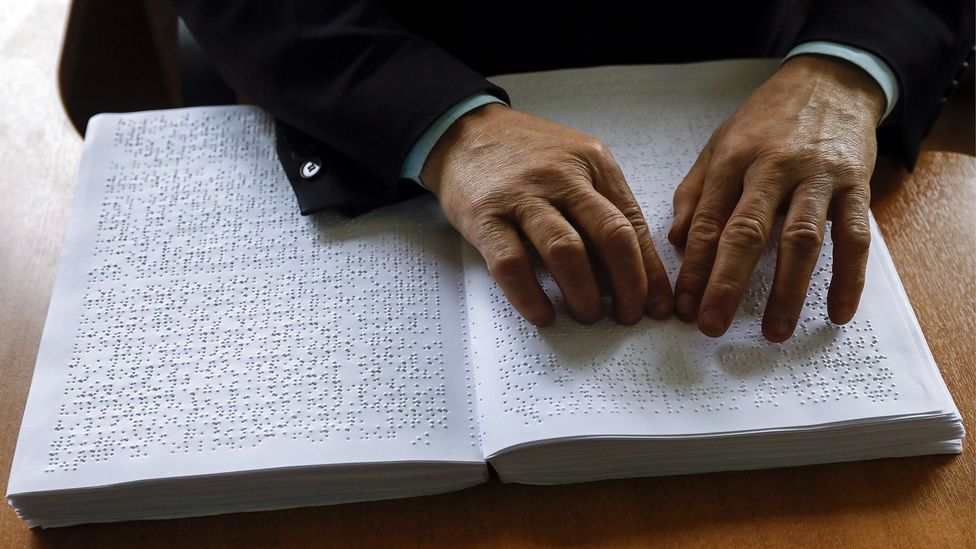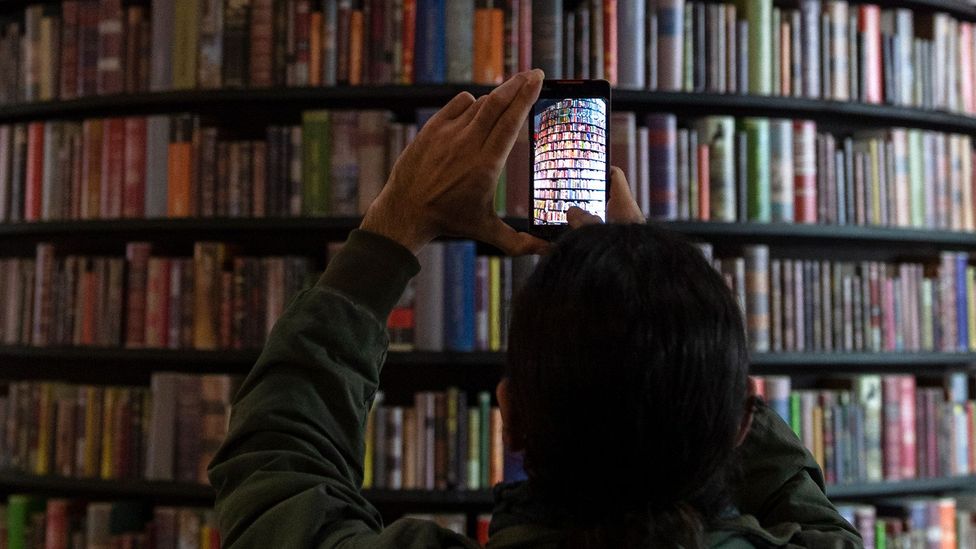Volunteer for Childrens Reading at Chapel Hill Library
Does reading fiction make us improve people?
(Prototype credit:
Getty Images
)

Reading fiction has been said to increment people'due south empathy and pity. But does the enquiry really carry that out?
Textual Healing is a season that explores the benefits of reading for mental wellness. Look out for stories on BBC Civilization, BBC Reel and BBC Hereafter and join BBC Civilization'due south Facebook group Textual Healing for more.
Every day more than 1.eight one thousand thousand books are sold in the U.s.a. and another one-half a million books are sold in the United kingdom of great britain and northern ireland. Despite all the other easy distractions bachelor to us today, at that place's no doubt that many people still love reading. Books can teach usa enough near the earth, of course, besides every bit improving our vocabularies and writing skills. But can fiction also make us improve people?
The claims for fiction are peachy. It's been credited with everything from an increase in volunteering and charitable giving to the tendency to vote – and even with the gradual decrease in violence over the centuries.
Characters hook u.s.a. into stories. Aristotle said that when we watch a tragedy ii emotions predominate: pity (for the character) and fright (for yourself). Without necessarily even noticing, nosotros imagine what it'southward like to exist them and compare their reactions to situations with how nosotros responded in the by, or imagine we might in the future.
You might also like:
• Tin can reading improve your mental health?
• How feeling bad changes the brain
• The amazing benefits of being bilingual
This exercise in perspective-taking is like a training class in understanding others. The Canadian cognitive psychologist Keith Oatley calls fiction "the heed'due south flight simulator". Just as pilots can practise flying without leaving the ground, people who read fiction may improve their social skills each time they open a novel. In his research, he has institute that as we begin to place with the characters, we start to consider their goals and desires instead of our own. When they are in danger, our hearts start to race. We might even gasp. But we read with luxury of knowing that none of this is happening to the states. We don't wet ourselves with terror or leap out of windows to escape.

Fiction has been chosen "the listen'due south flight simulator" (Credit: Getty Images)
Having said that, some of the neural mechanisms the brain uses to make sense of narratives in stories do share similarities with those used in real-life situations. If we read the discussion "kick", for example, areas of the brain related to physically boot are activated. If nosotros read that a character pulled a low-cal cord, activity increases in the region of the encephalon associated with grasping.
To follow a plot, we need to know who knows what, how they feel nearly information technology and what each graphic symbol believes others might exist thinking. This requires the skill known equally "theory of heed". When people read nearly a grapheme's thoughts, areas of the encephalon associated with theory of heed are activated.

When people read about a character's thoughts, areas of the brain associated with theory of listen are activated (Credit: Getty Images)
With all this practise in empathising with other people through reading, yous would think it would be possible to demonstrate that those who read fiction take improve social skills than those who read mostly non-fiction or don't read at all.
The difficulty with conducting this kind of research is that many of us have a tendency to exaggerate the number of books we've read. To become around this, Oatley and colleagues gave students a list of fiction and not-fiction writers and asked them to betoken which writers they had heard of. They warned them that a few fake names had been thrown in to bank check they weren't lying. The number of writers people take heard of turns out to be a good proxy for how much they actually read.

Many of us tend to exaggerate the number of books we've read (Credit: Getty Images)
Next, Oatley's squad gave people the "Mind in the Eyes" test, where you are given a series of photographs of pairs of optics. From the eyes and surrounding skin alone, your task is to divine which emotion a person is feeling. You are given a short list of options like shy, guilty, heedless or worried. The expressions are subtle and at first glance might appear neutral, so information technology's harder than it sounds. But those deemed to have read more fiction than non-fiction scored college on this test – equally well as on a scale measuring interpersonal sensitivity.
At the Princeton Social Neuroscience Lab, psychologist Diana Tamir has demonstrated that people who frequently read fiction take better social cognition. In other words, they're more than skilled at working out what other people are thinking and feeling. Using encephalon scans, she has found that while reading fiction, in that location is more activity in parts of the default mode network of the brain that are involved in simulating what other people are thinking.

People who oft read fiction take greater social cognition (Credit: Getty Images)
People who read novels appear to exist better than boilerplate at reading other people's emotions, only does that necessarily make them better people? To test this, researchers at used a method many a psychology student has tried at some indicate, where you "accidentally" drop a agglomeration of pens on the floor and and so run across who offers to assist you gather them upward. Before the pen-drop took identify participants were given a mood questionnaire interspersed with questions measuring empathy. Then they read a short story and answered a series of questions about to the extent they had felt transported while reading the story. Did they accept a bright mental pic of the characters? Did they want to learn more almost the characters afterward they'd finished the story?
The experimenters then said they needed to fetch something from another room and, oops, dropped six pens on the way out. It worked: the people who felt the almost transported by the story and expressed the most empathy for the characters were more likely to help retrieve the pens.
You might be wondering whether the people who cared the most well-nigh the characters in the story were the kinder people in the first place – every bit in, the type of people who would offering to help others. Just the authors of the study took into account people'southward scores for empathy and found that, regardless, those who were most transported by the story behaved more altruistically.

In ane experiment, people who felt almost transported by a story later behaved more altruistically (Credit: Getty Images)
Of form, experiments are 1 thing. Earlier we extrapolate to wider society nosotros demand to exist careful about the direction of causality. There is always the possibility that in real life, people who are more than empathic in the first place are more interested in other people's interior lives and that this interest draws them towards reading fiction. It's not an easy topic to inquiry: the ideal study would involving measuring people'southward empathy levels, randomly allocating them either to read numerous novels or none at all for many years, and then measuring their empathy levels again to see whether reading novels had made whatever difference.
Instead, curt-term studies have been washed. For instance, Dutch researchers arranged for students to read either paper articles about riots in Hellenic republic and liberation twenty-four hours in kingdom of the netherlands or the first chapter from Nobel Prize winner Jose Saramago's novel Blindness. In this story, a man is waiting in his car at traffic lights when he of a sudden goes blind. His passengers bring him dwelling house and a passer-by promises to drive his car home for him, only instead he steals it. When students read the story, non but did their empathy levels rise immediately later on, but provided they had felt emotionally transported by the story, a calendar week later they scored fifty-fifty higher on empathy than they did right after reading.
Of course, you could argue that fiction isn't alone in this. Nosotros can empathize with people we see in news stories likewise, and hopefully we oft do. But fiction has at least 3 advantages. Nosotros have access to the character's interior world in a manner we normally do not with journalism, and we are more probable to willingly append disbelief without questioning the veracity of what people are saying. Finally, novels allow us to do something that is hard to practise in our ain lives, which is to view a character's life over many years.

Some institutions consider reading to exist so pregnant that they include modules on literature (Credit: Getty Images)
So the enquiry shows that perhaps reading fiction does make people behave better. Certainly some institutions consider the effects of reading to be so significant that they now include modules on literature. At the Academy of California Irvine, for example, Johanna Shapiro from the Department of Family Medicine firmly believes that reading fiction results in ameliorate doctors and has led the establishment of a humanities programme to train medical students.
Information technology sounds as though it's time to lose the stereotype of the shy bookworm whose nose is always in a book because they find information technology difficult to bargain with real people. In fact, these bookworms might exist better than anybody else at understanding homo beings.
Textual Healingis a season that explores the benefits of reading for mental wellness. Expect out for stories on BBC Culture, BBC Reel and BBC Future and join BBC Civilisation's Facebook group Textual Healingfor more than.
Join more than ane meg Future fans by liking us on Facebook , or follow us on Twitter or Instagram .
If you liked this story, sign up for the weekly bbc.com features newsletter , called "If You Merely Read 6 Things This Week". A handpicked choice of stories from BBC Future, Civilization, Majuscule, and Travel, delivered to your inbox every Friday.
abadwhorknotho1940.blogspot.com
Source: https://www.bbc.com/future/article/20190523-does-reading-fiction-make-us-better-people
0 Response to "Volunteer for Childrens Reading at Chapel Hill Library"
Postar um comentário